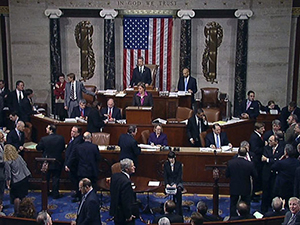 As we reported earlier today, the House of Representatives passed H.R. 3309, the Innovation Act, by a 325 - 91 vote. There was support for the bill from both parties, with 195 Republicans and 130 Democrats voting for the bill. On the other hand, more Democrats were opposed to the bill, with 64 Democrats and only 27 Republicans voting against it. Nine Republicans and six Democrats did not take part in the vote.
As we reported earlier today, the House of Representatives passed H.R. 3309, the Innovation Act, by a 325 - 91 vote. There was support for the bill from both parties, with 195 Republicans and 130 Democrats voting for the bill. On the other hand, more Democrats were opposed to the bill, with 64 Democrats and only 27 Republicans voting against it. Nine Republicans and six Democrats did not take part in the vote.
The House took up the matter as a Committee of the Whole in the morning, and proceeded with one hour of general debate on the bill from the Judiciary Committee (see "'Non-Practicing Lawmakers' -- The Mark-up of H.R. 3309 (Innovation Act)"). Interestingly, both supporters and opponents of the bill looked to the impact it would have on small businesses, with the former arguing that the bill is necessary to protect small companies, while the latter pointed to the unintended consequences the bill will have for small businesses. For example, it was pointed out that the fee-shifting provision would likely favor wealthy parties; while at the same time "chilling" small inventors from pursuing legitimate patent infringement claims. The House then considered eight amendments. Two of these amendments were adopted via voice vote during debate. In the first of these, Rep. Polis of Colorado proposed including the identification of "the ultimate parent entity of the claimant" within the list of pre-suit notification requirements necessary to allege willful infringement. The second was offered by Rep. Jackson Lee of Texas, and provided for a study on the impact of this legislation on the ability of individuals and small businesses to protect exclusive rights to inventions and discoveries, and specifically on its impact on women, veterans, and minorities.
The votes on the remaining six amendments were postponed until debate on all of the amendments was concluded. Only two of these amendments were approved via recorded vote. The first was a manager's amendment introduced by Rep. Goodlatte of Virginia, the Chairman of the House Committee on the Judiciary. This amendment should be somewhat good news for readers of this blog. In addition to some technical corrections, Rep. Goodlatte created an exception to the new staged-discovery requirements for any cause of action for which resolution within a specified period of time would necessarily affect the rights of a party with respect to a patent. The amendment specifically calls out Hatch-Waxman litigation brought pursuant to 35 U.S.C. § 271(e), but would presumably impact biosimilar litigation also. In addition, actions alleging competitive harm would be exempted from these discovery requirements, such as when a preliminary injunction is sought to redress harm from a competitor. Finally, the amendment specified that the parties could opt out of these discovery requirements voluntarily. The only other amendment to be adopted via recorded vote was introduced by Rep. Rohrabacher of California. This amendment removed the provision in the Innovation Act that would have done away with § 145 actions, by which a patentee can bring an action in district court (allowing for the introduction of new evidence) to challenge a rejection of a patent application by the Board. A similar amendment was proposed during the mark-up of the Innovation Act in committee, where it was opposed by Rep. Goodlatte and ultimately defeated.
The remaining four amendments were not adopted by the House. In the first of these, Rep. Watt of North Carolina proposed an amendment to the fee-shifting provision, which would have allowed a judge to consider dilatory or other abusive tactics by a prevailing party in determining whether an awarded fee should be reduced or denied. Second, Rep. Massie of Kentucky proposed striking section 5 of the bill, which would have eliminated the "customer-suit exception" provision. Third, Rep. Jackson Lee proposed expanding the definition of covered customers in the same section 5 to include all small businesses as long as its annual revenue does not exceed $25 million. Finally, Rep. Conyers of Michigan and Rep. Watt proposed a substitute amendment, which would have replaced the entire Innovation Act with a different bill entitled the "Deceptive Patent Practices Reduction Act." This substitute bill appeared to contain the provisions that the Democrats on the Judiciary Committee were able to support, and did not contain many of the more controversial provisions as judged by comments from the patent community. Interestingly, this "Deceptive Patent Practices Reduction Act" appears to be more closely aligned to the "Patent Transparency and Improvements Act of 2013," which Sen. Leahy introduced in the Senate as a "companion" piece to the Innovation Act.
The "Innovation Act" will next move on to the Senate, where Sen. Leahy's aforementioned "Patent Transparency and Improvements Act of 2013" is already pending (see "Yet Another 'Patent-Troll' Bill – Senator Leahy Introduces Patent Transparency and Improvements Act"). It will be interesting to see which version the bill the Senate actually considers and ultimately votes on. This will, of course, be an indication of whether a true "reform" bill will come out of this current Congress. However, the common thread running through today's debate was that this is still a bill in progress, even though it passed by an overwhelming margin. Perhaps there is hope that a more measured bill will be ultimately agreed upon by both the House and Senate, and that if a bill does become law, it will be more narrowly tailored to address the perceived "patent troll" problem that is the alleged impetus behind these legislative efforts in the first place.